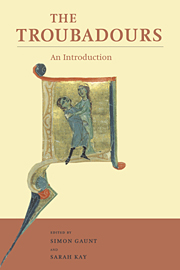Book contents
- Frontmatter
- Contents
- List of contributors
- Preface
- Map of Occitania and neighbouring Catalonia
- Introduction
- 1 Courtly culture in medieval Occitania
- 2 Fin'amor and the development of the courtly canso
- 3 Moral and satirical poetry
- 4 The early troubadours: Guilhem IX to Bernart de Ventadorn
- 5 The classical period: from Raimbaut d'Aurenga to Arnaut Daniel
- 6 The later troubadours
- 7 The trobairitz
- 8 Italian and Catalan troubadours
- 9 Music and versification
- 10 Rhetoric and hermeneutics
- 11 Intertextuality and dialogism in the troubadours
- 12 The troubadours at play: irony, parody and burlesque
- 13 Desire and subjectivity
- 14 Orality and writing: the text of the troubadour poem
- 15 The chansonniers as books
- 16 Troubadour lyric and Old French narrative
- Appendix 1 Major troubadours
- Appendix 2 Occitan terms
- Appendix 3 Research tools and reference works
- Appendix 4 The chansonniers
- Bibliography
- Index
13 - Desire and subjectivity
Published online by Cambridge University Press: 05 June 2012
- Frontmatter
- Contents
- List of contributors
- Preface
- Map of Occitania and neighbouring Catalonia
- Introduction
- 1 Courtly culture in medieval Occitania
- 2 Fin'amor and the development of the courtly canso
- 3 Moral and satirical poetry
- 4 The early troubadours: Guilhem IX to Bernart de Ventadorn
- 5 The classical period: from Raimbaut d'Aurenga to Arnaut Daniel
- 6 The later troubadours
- 7 The trobairitz
- 8 Italian and Catalan troubadours
- 9 Music and versification
- 10 Rhetoric and hermeneutics
- 11 Intertextuality and dialogism in the troubadours
- 12 The troubadours at play: irony, parody and burlesque
- 13 Desire and subjectivity
- 14 Orality and writing: the text of the troubadour poem
- 15 The chansonniers as books
- 16 Troubadour lyric and Old French narrative
- Appendix 1 Major troubadours
- Appendix 2 Occitan terms
- Appendix 3 Research tools and reference works
- Appendix 4 The chansonniers
- Bibliography
- Index
Summary
In his monumental Essai de poétique médiévale of 1972, Paul Zumthor represents medieval lyric poetry as a closed system of mutually referring formal elements. Each poem is now wholly defined in relation to that system, the human circumstances of its production being irrecuperably lost. For the modern critic, Zumthor concluded, there can be no subjectivity in the medieval lyric; it can only be seen as ‘objectified’ by the codes that shape it. Zumthor's influence has been so great that subjectivity, and with it desire, have long been marginalised topics in troubadour studies. This is ironic since modern conceptions of both desire and subjectivity position them in relation to language, and thus as dependent on precisely those verbal and rhetorical codes valorised in Zumthor's approach.
Desire and subjectivity have, of course, always been a key element in psychoanalytical criticism, but this too has tended to be marginal to the reception of troubadour poetry. The most commonly given reason for rejecting the psychoanalytical approach is its alleged anachronism. While this may have some plausibility where Freudian analysis is concerned, it is firmly rebutted by Lacan's insistence that language, which is what gives shape to everything we can apprehend, is subject to historical contingency and changeability. Indeed, emphasis on what he calls the signifier (the material dimension of language) can provide a new impetus to the close reading of early texts.
- Type
- Chapter
- Information
- The TroubadoursAn Introduction, pp. 212 - 227Publisher: Cambridge University PressPrint publication year: 1999
- 6
- Cited by



